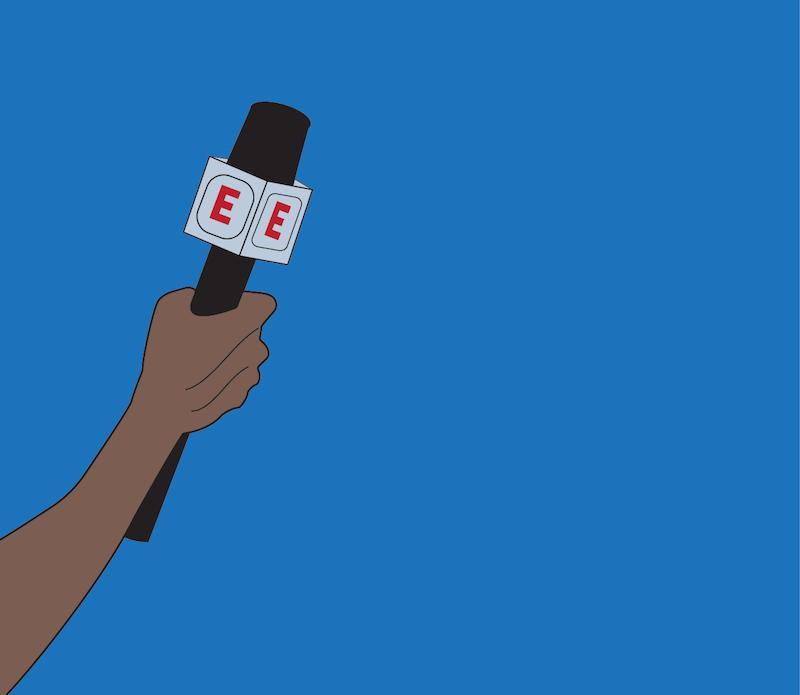Every morning before leaving for work, my father would blare ESPN on the living room TV. You could expect to hear a roundtable of men passionately arguing at 7 a.m. about a recent Lakers game or debating if Tom Brady is the greatest quarterback of all time. Later on, I realized I only heard the voices of male anchors speaking in such roundtable discussions. Even if there were female anchors present, they did not represent me. They were more likely to be white than a person of color. To see a woman of color, specifically a Black woman, be at a “boys’ club” roundtable or to see them as the face of sideline coverage is inspiring, yet more unexpected to see.
ESPN claims itself as “the leading multinational, multimedia sports entertainment brand,” however, it largely contributes to racial and gender inequalities within the sports media world.
A 2021 study done by the Institute for Diversity and Ethics in Sports (TIDES) evaluated over 100 newspapers and websites’ hiring practices. This study was reported by Richard Lapchick, a contributing writer for ESPN. The report found that in 2021, 77.1% of sports reporters and 77.1% of sports columnists are white; 85.6% and 82.2% are men, respectively. The lack of diversity in sports media goes beyond ESPN: it’s at other sports networks and sports news sections too. The racial percentages and the percentages of women in sports media have slightly improved since the study was last researched in 2018, but that doesn’t mean the inequality issue is fully resolved.
I can name the number of Black female sports journalists from ESPN (current and former) on one hand: Jemele Hill, Cari Champion, Maria Taylor and Malika Andrews. Now, compare that small number to the number of male and/or white sports journalists one could name from ESPN.
A few of ESPN’s Black journalists, many mentioned above, have been exiting the network in the last few years. For example, Jemele Hill departed from the network after they suspended her for tweets calling President Donald Trump a “white supremacist” and her tweets about Dallas Cowboys owner Jerry Jones’ comments toward his players kneeling during the national anthem.
More recently, Maria Taylor decided not to renew her contract with ESPN due to failure to reach an agreement regarding her salary. The network offered her a $2 million raise ($3 million salary total), but Taylor wished to reach a salary in the range of Stephen A. Smith’s, a popular male anchor who makes nearly $8 million a year.
Reform and a call to action is necessary to support women of color in sports media.
Unequal salaries and stifling free expression are only a few of the issues that they face in the workplace.
The experiences that women tend to face also differ due to intersectionality. When the race and gender fault lines come into play, women’s experiences within the workplace can start to differentiate. Sports media is no stranger to that.
In July 2021, the New York Times published an article exposing a feud between ESPN white female sports analysts Rachel Nichols and Maria Taylor, who is Black. In 2020, Nichols made comments on a recorded video call insinuating that Taylor wasn’t qualified to take Nichols’ job as an NBA Finals coverage reporter, remarking that Taylor only got the promotion because of her race. Nichols claimed the network did so due to its “crappy longtime record of diversity.”
She continued by saying, “Just find it somewhere else. You are not going to find it from me or taking my thing away.” per The New York Times.
Since then, Nichols has been replaced for NBA coverage by both Taylor and another Black female anchor, Malika Andrews.
Malika Andrews has now replaced Nichols’ now-canceled weekday show “The Jump” for the new show “NBA Today” that began on Oct. 18.
Though I look forward to Andrews’ rise, I can’t help but question if this is a step in the right direction. I don’t think a simple replacement completely resolves the complexities of race and inequity that’s been happening for so long.
Yes, Black sports journalists — especially women — deserve a platform. They deserve a platform because of their authenticity, the perspectives they offer and the qualities that make them great journalists. I want sports networks to genuinely value their employees of color when attempting to improve their diversity ratings.
With that being said, people are not replaceable. ESPN and other news networks should not practice tokenism — making a token effort offering opportunities to minorities only for the purpose of diversity numbers. Since Maria Taylor has departed the network, I do not wish for Malika Andrews to be a ‘replacement Maria Taylor’ or a sole Black female token for ESPN. There should be more than just one.
ESPN should not make the same mistakes they’ve made in the past: pushing their Black female employees away. The network should actively listen to current and future female employees of color and their experiences. Then, the network should ask the employees what they need from them in order to effectively improve their diversity and inequity issues. Suggestions for reform include more airtime for female reporters of color, raises in salary compared to male counterparts, and offering a platform for an all-women of color sports roundtable. Since ESPN is a substantial part of the sports media world, these proposed actions from them can prompt other sports news organizations to do the same.
The Maneater encourages you to donate to the United Negro College Fund (UNCF), a nonprofit organization that funds scholarships for Black and minority students to attend college and help them achieve in higher education. https://secure2.convio.net/uncf/site/SPageNavigator/Donate.html
Edited by Sarah Rubinstein | [email protected]











